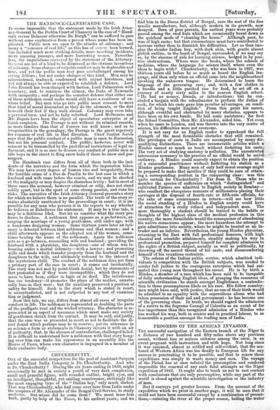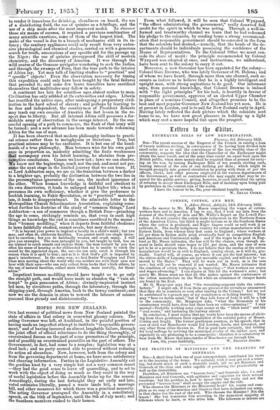PROGRESS OF THE AFRICAN INVASION.
THE successful navigation of the Eastern branch of the Niger to a distance of two hundred and fifty miles above any previous ascent, without loss or serious sickness among the crew, is an event pregnant with instruction and with hope. Not long since it was assumed, almost as settled and self-evident, that the sea- board of Western Africa was too deadly to European life for any success in penetrating it to be possible, and that to renew these expeditions was simply to waste money and men. The voyage of the Pleiad has at once refuted the presumption and rendered: impossible the renewal of any such fatal attempts as the Niger expedition of 1842. It ought also to teach us not to rest content with conclusions that are only presumptive, while any part of the world is closed against the scientific investigation or the industry" of man.
But it conveys yet greater lessons. From the account of the_ expedition which we print in another page, it will be seen that it could not have been successful except by a combination of precan- tions,—entering the river at the proper season, boiling the water
to render it inflexions for drinkii.g, cleanliness on board, the use of a disinfecting fluid, the use of quinine as a febrifuge, and the use of a ship made after the most improved modeL To discover these six means of success, it required a previous combination of many scientific exertions, some of them of the largest kind. The make of the vessel is due to a branch of mechanics still in its in- fancy ; the sanitary appliances could only result from very exten- sive physiological and chemical studies, carried on with a generous search for truth, unconscious of any specific aid for the passage up the Niger; the use of quinine presupposed the skill of modern chemistry, and the discovery of America. It was through the wild course of the Genoese navigator wandering to seek the Indies, and through the swamps of Peru, that the true path to the interior of Africa lay. Yet men talk of limiting studies to "practical" and "specific" objects ! Even the observation necessary for timing this expedition could only have been bought by the fatal failures that preceded it; and some few brave travellers have sacrificed themselves that multitudes may follow in safety. A continent has lain for countless ages almost useless to man. Civilization has only nibbled at its extremities and edges. Liberia has resettled the native race, after undergoing a preparatory civil- ization in the hard school of slavery; and perhaps by learning to be free and independent, the countrymen of President Roberts may teach our own cousins of America the last lesson in the re- spect due to liberty. But all internal Africa still possesses a for- midable army of observation in the savage interest. By the suc- cessful opening of a path to commerce, the flank of that army will be turned; and a new advance has been made towards redeeming Africa for the use of man.
It has been observed that modern philosophy inclines to practi- cal science rather than to metaphysics or literature. True, but practical science may be too exclusive. It is but one of the hand- maids of a true philosophy. Man becomes wise for his own guid- ance in proportion as, modestly admitting the finite weaknesses that accompany even his latest learning, he abstains from pre- 3umptive conclusions. Causes we know not ; laws we can observe. We know not the beginnings, reach not the end, and must not pre. gums the next stage in the limited journey that we can trace. If, as Lord Ashburton says, we are on the transition between a darker to a brighter age, probably the distinetion between the two lies in the presumptuous ignorance of the one, the modest ignorance of the other. When human knowledge is faithful and obedient to its own discoveries, it leads to enlarged and higher life; when it presumes its own sufficiency, whether it give the preference to bookish learning, to Fakir ft eculation, or to "practical" material- ism, it leads to disappointment. In the admirable letter to the Metropolitan Church Schoolmasters Association, explaining some- what further his doctrine of the study of "common things," Lord Ashburton—a son of commerce though a British Peer—preaching the age to come, strikingly reminds us, that even in such high things as knowledge the end is sometimes sacrificed to the means ; that "human meddling," when it departs from faithful obedience to laws faithfully studied, cannot create, but may destroy. "It is beyond your power to implant a faculty in a child's mind ; but you may, and often do, obliterate faculties. You cannot instil one single incen- tive to exertion; but you do habitually weaken and crush many. I will give you examples. The man untaught by you but taught by God, has an ear trained to catch sounds and imitate them : le man trained by you has often his sense of hearing so far obliterated that he is unable to catch the sound by the appointed organ, the ear—he can only catch it through his reason when it is spelt to him ; and so it is that God's gift is impaired by man's interference. In the same way, we find Senior Wranglers and First Class men moving about the world who can neither see with their eyes nor hear with their ears—who can only collect from books that which others, by the use of natural faculties, collect more vividly, more usefully, for them- selves."
Impatient human meddling would Shave taught us to go only the straight path, and would have made us abandon the "vain at- tempt" to gain possession of Africa: divinely-implanted instinct led men, by circuitous paths, through the laboratory, through the shipping-yard, through America, back to the tawny continent; and now we see the domain in store to reward the labours of science pursued thus piously and disinterestedly.



























 Previous page
Previous page